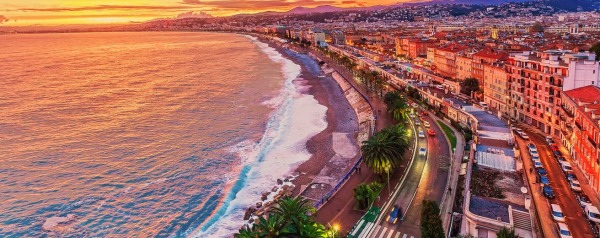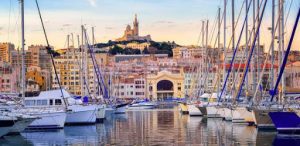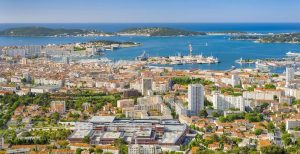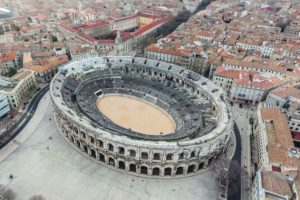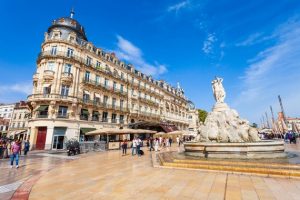France : Safety by City
- Bordeaux
- Le Havre
- Lille
- Lyon
- Marseille
- Martinique
- Montpellier
- Nantes
- Nice
- Nimes
- Paris
- Reims
- Rennes
- Strasbourg
- Toulon
- Toulouse
Nice is the seventh most populous urban area in France and the capital of the Alpes-Maritimes department. Nice’s metropolitan area extends beyond the administrative city limits, with a population of nearly 1 million. Located in the French Riviera, on the southeast coast of France on the Mediterranean Sea, at the Alps’ foot, Nice is the second-largest French city on the Mediterranean coast and the second-largest city in the Provence-Alpes-Côte d’Azur region after Marseille.
Warnings & Dangers in Nice

OVERALL RISK : LOW
Nice is generally safe to travel to. However, tourists should keep track of their belongings and do not leave bags and money unattended. It is better to bypass some areas and not walk the city streets late at night.

TRANSPORT & TAXIS RISK : MEDIUM
There are pickpockets on public transport in Nice, so be careful here. Use licensed taxis for safe transportation.

PICKPOCKETS RISK : MEDIUM
Nice is a tourist city and a lot of people come here. And this attracts pickpockets. It would help if you were especially careful with your personal belongings in places such as train stations, public transport, and tourist attractions.

NATURAL DISASTERS RISK : LOW
The city is not subject to any serious risks of natural disasters.

MUGGING RISK : LOW
The risk of serious robbery and armed attacks is shallow in Nice. There is little danger of these attacks in the suburbs. However, the likelihood that you will be attacked is minimal.

TERRORISM RISK : LOW
The risk of terrorism is low in Nice. But the global risk of terrorist attacks in public areas exists worldwide, so tourists should be vigilant.

SCAMS RISK : MEDIUM
Most often, fraud in Nice is associated with the sale of fake souvenirs and things and robberies with rented cars. Be careful and double-check the products and services you order.

WOMEN TRAVELERS RISK : LOW
Women traveling alone to Nice can feel at ease in the city. You should exercise the usual care and attention, and avoid walking late at night in remote areas of the city.
How Safe Is Nice for Tourists?
Nice has an average level of security, with a crime rate ranging from low to medium.
The main problems are associated with petty robberies, car theft, and fraud.
Nice attracts a large number of tourists every year.
Therefore, the main problems here are associated with the fact that tourists attract scammers and thieves.
To avoid most of the problems, you need to not act like a tourist and consider your surroundings.
Don’t shine with expensive devices and cash – this also attracts thieves.
Do not leave valuable things in your car – there are known cases of hacking cars for the sake of what lies inside.
The rest of the city is quite hospitable and calm.
You can safely move around here at any time of the day or night.
Of course, you should avoid the city’s remote streets and do not walk alone late at night.
Always keep track of your belongings anyway.
And also, be careful with those who ask for or transfer help – they can be scammers.
Use only licensed taxi services – they are safe.
And in public transport, watch your pockets – there can be pickpockets here, as elsewhere.
Do I Need a Visa to Visit Nice?
A visa is an entry permit for a short, temporary visit of fewer than 90 days. A valid passport is a must.
Which Currency Is Used in Nice?
The euro is the official currency in France. The euro is divided into 100 cents.
How's the Weather like in Nice?
In Nice, the summers are short, warm, humid, dry, and mostly clear, and the winters are long, cold, and partly cloudy. The best time to visit Nice is June to September.
What Do I Need to Know about Airports in Nice?
You can reach Nice from the as Aéroport International Strasbourg, Aéroport Lyon-St Exupéry, Aéroport Marseille-Provence, Aéroport Nantes Atlantique, Aéroport Nice Côte d’Azur, and Aéroport Toulouse-Blagnac.
Should I Get Travel Insurance for My Travels?
A travel insurance policy is a must when visiting a foreign country or city. Make sure you got it before starting your journey; the customs officer may ask for it.
What Are Some Things to Do in Nice?
Founded by the Greeks and later a retreat for the 19th-century European elite, the city has also attracted artists. Former resident Henri Matisse is honored with a career-spanning collection of paintings at Musée Matisse. Musée Marc Chagall features some of its namesake’s major religious works.
Is the Water in Nice Safe to Drink?
Tap water is safe to drink in Nice.
Is Uber Safe in Nice?
There is an Uber taxi in Nice. You can call a taxi from the app on your phone. The cost of the trip will depend on the distance and time of day.
